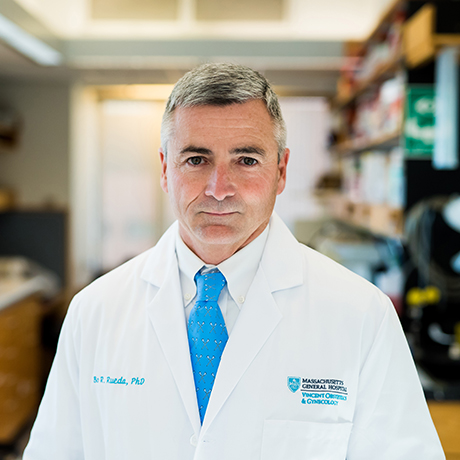Bo Rueda, PhD
Bo Rueda, PhD
The Vincent Center for Reproductive Biology
About Bo Rueda, PhD
Director,
Vincent Center for Reproductive Biology, Massachusetts General Hospital
Director,
Clinical Fellows Research Program, Department of Obstetrics and Gynecology, Massachusetts General Hospital
Associate Professor,
Department of Obstetrics, Gynecology and Reproductive Biology, Harvard Medical School
Affiliated Faculty,
Harvard Stem Cell Institute
Affiliated Faculty,
Massachusetts General Hospital Cancer Center
A major effort in the laboratory of Bo Rueda, PhD, has been in the identification and functional characterization of gynecological cancer cells.
Molecular Interrogation of Gynecologic Tumors
My group molecularly interrogates gynecologic tumors to identify genes or proteins and their corresponding signaling pathways that contribute to malignant transformation, the pathology of the disease, recurrence and/or resistance to therapy.
Once key factors or pathways are identified, we actively test novel anticancer drugs to determine their efficacy in tumor explant models. To accomplish this we maintain a gyn-focused tissue repository. The repository infrastructure is extensive and is designed to collect malignant and benign tissues along with clinically annotated information.
To complement the banking efforts my group has developed a Bio-Banking infrastructure. To this end we utilize a well-established in vivo experimental system in which primary tumors collected from ovarian and endometrial cancer patients at the time of initial surgery are grown in NOD/SCID mice. These explanted tumors and the primary tumors are genotyped and undergo cryopreservation using state of the art techniques.
Once thawed, the tumors can be propagated in vivo through serial transplantation over several passages while retaining their original genotype and histophenotype. This allows for the generation of large cohorts of matched xenograft tumors ready for use in multi-armed therapeutic experiments.
Our work to date provides evidence to suggest the clinical course of the primary tumor mimics the behavior and responses we have seen in our explants further supporting the potential clinical utility of our xenograft model.
In addition, we can use our models to assess the efficacy of dual or sequential therapy. Specifically, we assess whether novel anti-cancer agents work better as a single agent or in conjunction with the standard of care or another anti-cancer agent.
As a result of our multiple interactions with pharmaceutical companies we have become more proactive in formulating stronger collaborations with the intent to develop novel inhibitors of oncogenic pathways, identify susceptible immune checkpoints, test new immune treatment strategies, and generate specific antibody drug conjugates for the treatment of women diagnosed with endometrial or ovarian cancer.
Investigation into the functional significance of the functional contribution of gynecologic cancer stem cells
My group has extensively studied and continues to conduct research focused on the functional contribution of sub populations of gynecologic cancer cells that have stem like characteristics, a contributing factor to the pathology and high recurrence rate. Our research provided valuable rationale for identifying targetable cells and testing combination therapies that can be tested in clinical trials for women with recurrent and refractory gynecologic cancer.
Investigation into the functional significance of aberrant forms of glycosylation in gynecologic cancers
Tumor-associated carbohydrate antigens (TACAs) are promising therapeutic targets. Increased presence of Sialyl-Thomsen-nouveau antigen (STn), a TACA, correlates with worsened outcome and chemoresistance in ovarian cancer (OvCa).However, our recent studies suggest that many of the previous published reports that supported this conclusion utilized STn antibodies that may not be as specific as originally proposed. We are working with a panel of murine and humanized antibodies that bind with high specificity to all glycoforms of STn.
Our preliminary data utilizing these novel highly specific STn antibodies suggests that STn is present in a significant subset of OvCa cells and tumors. From a therapeutic standpoint, we are testing STn-antibody drug conjugates (ADC) in in vitro and in vivo models.
Define mechanisms that contribute to the genesis, progression or pathology of benign gynecologic diseases
In addition to in depth studies on gynecologic malignances we also focus on benign diseases that impact reproductive aged women. Specifically, we have and continue to be focused on endometriosis and leiomyoma. These non-malignant diseases can have a devastating negative impact on women’s health and quality of life.Despite the prevalence of the disease very little progress have been made in long term solutions with the exception of surgical removal of the of uterus. We have used mouse models as well as primary human tissues to assess the mechanisms by which specific cell signaling factors positively or negatively impact the development, progression and/or pathological properties associated with these diseases.
Research at Mass General
Every day, our clinicians and scientists chart new terrain in biomedical research to treat and prevent human disease and advance patient care.

